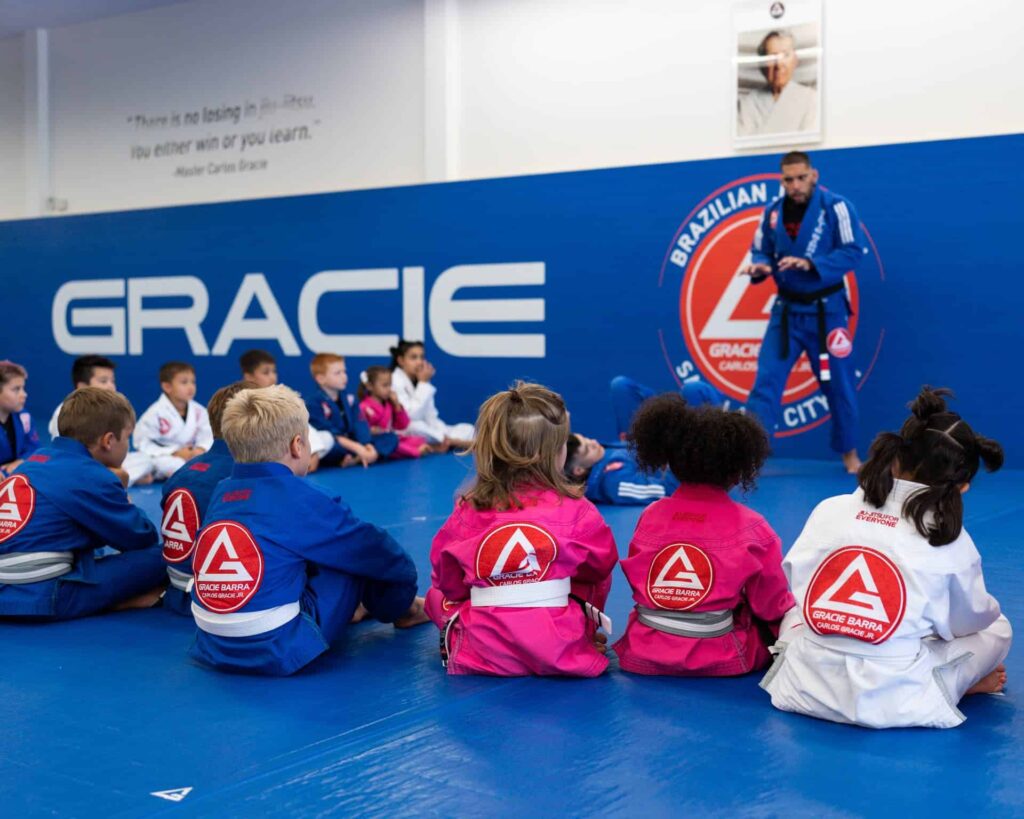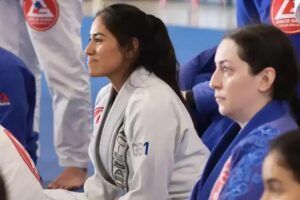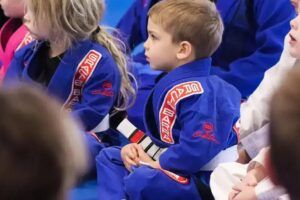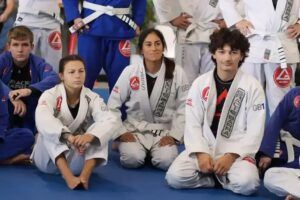The mental health benefits of Brazilian Jiu-Jitsu (BJJ) are profound and transformative. Engaging in this martial art can significantly enhance your mental well-being, offering a unique blend of physical activity, community, and personal growth. If you’ve been feeling overwhelmed or simply want to improve your mental health, BJJ might be the perfect avenue for you.
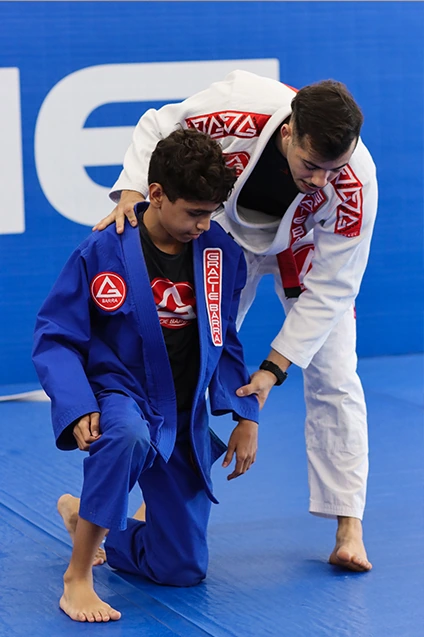
A Problem-Solving Practice in Martial Arts
Mental health challenges are common, with many people experiencing varying degrees of anxiety, stress, and depression. According to the National Alliance on Mental Illness:
- Nearly 19 percent of U.S. adults face mental illness each year.
- For some, these issues significantly interfere with daily life.
Brazilian Jiu-Jitsu (BJJ) stands out as a powerful tool for building mental resilience. Practitioners engage in a constant battle with their minds, learning techniques that require focus and mental agility. Professor Seidler Rodrigo, head professor at Gracie Barra Salt Lake City (GBSLC), explains:
“In Brazilian Jiu-Jitsu, you’re not just training your body; you’re training your mind to stay calm and collected in challenging situations.”
Through regular practice, students develop problem-solving skills that extend beyond the mat, applying them to everyday challenges like managing work stress, resolving personal conflicts, or tackling unexpected situations. The focus and presence required in BJJ create a unique mental framework for navigating life’s hurdles.
Building Resilience Through Practice
One of the most significant mental health benefits of Brazilian Jiu-Jitsu is its ability to build resilience. The practice places you in challenging positions, both physically and mentally, helping you learn how to cope with adversity and stress.
Overcoming Physical and Mental Challenges
When you step onto the mat, you face situations that push your limits. The discomfort of these situations teaches valuable coping mechanisms, allowing you to grow stronger and more adaptable over time. Jiu-Jitsu forces practitioners to confront failure—tapping out or losing a position is part of the learning process. This experience helps develop a healthier attitude toward setbacks, teaching you to see failure as a stepping stone rather than a roadblock.
The Power of Small Adjustments
Professor Rodrigo often shares a key insight:
“Small movements can make the biggest difference.”
This philosophy applies not only to Jiu Jitsu but also to life. Even in seemingly dire circumstances, small adjustments can lead to significant improvements.
Practical Resilience for Everyday Life
By practicing regularly, you learn to navigate life’s challenges with an adaptable mindset. This newfound perspective makes it easier to tackle personal and professional hurdles with confidence and determination. The lessons from the mat—patience, strategy, and adaptability—help practitioners stay calm under pressure in daily life.
Community Support and Connection
Beyond individual resilience, Brazilian Jiu-Jitsu fosters a strong sense of community. Joining a BJJ academy like Gracie Barra Salt Lake City means becoming part of a supportive family where mutual encouragement and shared goals are central.
Building Emotional Connections
Training with others creates lasting friendships and a network of emotional support. These relationships are vital for mental health, providing a safe space to share struggles and celebrate successes. Practitioners often describe the camaraderie of their BJJ academy as a “second family” that offers connection and belonging in a world where social isolation is increasingly common.
A Welcoming Environment for Everyone
At GBSLC, inclusivity is a cornerstone. Regardless of age, fitness level, or background, every student finds encouragement and support, making the journey in BJJ even more rewarding. Many practitioners find the support they receive on the mat helps them build confidence in other areas of their lives, from social interactions to career growth.
The Role of Mentorship
Mentorship is another critical component of the Jiu Jitsu community. More experienced students and instructors guide beginners, offering both technical advice and emotional encouragement. This mentorship dynamic fosters personal growth and strengthens the bonds within the community.
Physical Fitness and Mental Clarity
The physical aspect of Brazilian Jiu-Jitsu also contributes significantly to mental health improvement. Regular training boosts endorphins, the body’s natural mood enhancers, and helps clear the mind.
The Connection Between Fitness and Mental Health
Training not only improves grappling techniques but also enhances overall fitness, which directly impacts mental well-being. As Professor Rodrigo explains:
“Training in Brazilian Jiu-Jitsu is not just about learning self-defense; it’s about improving your physical health, which directly impacts your mental state.”
Enhanced Confidence and Self-Esteem
As you develop skills and build strength, you’ll likely notice improvements in confidence and self-esteem, empowering you to tackle everyday challenges with a positive outlook. Progress in Jiu Jitsu is highly measurable—earning stripes on your belt or mastering a new technique provides tangible proof of your growth, boosting motivation and self-belief.
Mindfulness Through Focused Training
Focusing on techniques during training requires full mental engagement, providing a meditative, distraction-free environment. This form of mindfulness can reduce stress and improve clarity in your daily life. Additionally, this mental clarity often translates into better decision-making, helping practitioners prioritize and address their responsibilities more effectively.
Stress Relief Through Movement and Focus
Modern life can be stressful, but Brazilian Jiu-Jitsu offers a highly effective outlet for releasing tension. The physical movement and mental focus required in training help practitioners leave worries behind.
Professor Rodrigo describes it perfectly:
“When you’re on the mat, all your worries fade away; it’s just you and your training partner focusing on the moment.”
BJJ also provides a sense of accomplishment after each session, replacing stress with satisfaction and relaxation. The structured environment of training allows you to channel energy constructively, reducing feelings of restlessness or frustration.
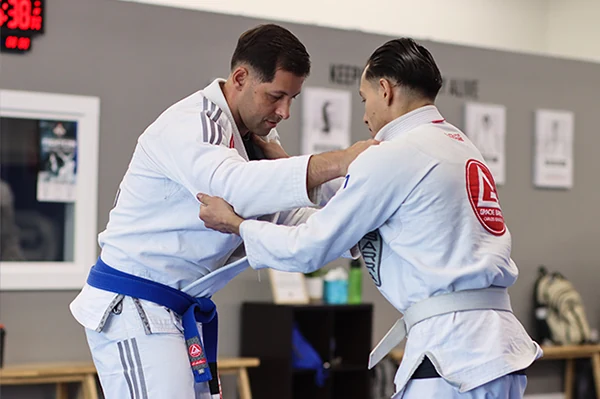
Conclusion: Transform Your Mental Health with Jiu Jitsu
The mental health benefits of Brazilian Jiu-Jitsu are vast and impactful. From building resilience and fostering community connections to promoting physical fitness and providing stress relief, BJJ offers a holistic approach to well-being.
It’s not just a martial art; it’s a lifestyle that empowers individuals to grow mentally, physically, and emotionally. Whether you’re seeking stress relief, a supportive community, or personal growth, Jiu Jitsu can provide the tools you need to enhance your life.
If you’re ready to experience these benefits firsthand, book a free trial class at Gracie Barra Salt Lake City today! Discover how Brazilian Jiu-Jitsu can help you grow, one roll at a time.
FAQ about Brazilian Jiu-Jitsu and Mental Health
1. What is Brazilian Jiu-Jitsu, and how does it impact mental health?
Brazilian Jiu-Jitsu (BJJ) is a martial art that focuses on grappling and ground fighting, emphasizing technique over brute strength. It enhances mental health by improving resilience, focus, and emotional regulation while reducing stress and anxiety through physical activity and mindfulness.
2. Can Jiu Jitsu help with anxiety and stress?
Yes, Jiu Jitsu is highly effective in reducing anxiety and stress. The physical activity releases endorphins, which are natural mood lifters. Additionally, the practice requires focus and presence, offering a form of mindfulness that helps you disconnect from every day worries.
3. How does Brazilian Jiu-Jitsu build mental resilience?
BJJ teaches practitioners to stay calm under pressure, solve problems on the fly, and recover from setbacks. Constantly facing and overcoming challenges on the mat strengthens your ability to cope with stress and adversity in everyday life.
4. Is Jiu Jitsu good for beginners with no fitness background?
Absolutely! Brazilian Jiu Jitsu is inclusive and suitable for all fitness levels. Most academies, like Gracie Barra, have beginner-friendly classes and a supportive environment where newcomers can learn at their own pace.
5. How does the community aspect of Jiu Jitsu improve mental health?
The supportive and inclusive community in Jiu Jitsu fosters strong connections. Training partners encourage each other, celebrate successes, and provide emotional support, creating a sense of belonging that combats loneliness and isolation.
6. Can Jiu Jitsu improve focus and concentration?
Yes, Jiu Jitsu sharpens focus and concentration by requiring you to stay mentally engaged during training and sparring. These skills often translate to improved attention and productivity in other areas of life, such as work and school.
7. What role does physical fitness play in the mental health benefits of Jiu Jitsu?
Physical fitness is a crucial component of BJJ’s mental health benefits. Regular training boosts endorphin levels, enhances cardiovascular health, and improves overall well-being. As your physical fitness improves, you often experience increased confidence and reduced symptoms of depression or anxiety.
8. Is Jiu Jitsu a good way to relieve stress?
Yes, Jiu Jitsu is an excellent way to relieve stress. Rolling on the mat allows you to channel tension into physical activity, and the focus required during training provides a mental escape from daily pressures.
9. Can women benefit from Jiu Jitsu for mental health?
100%! Women can benefit from Jiu Jitsu in the same ways as men, including improved confidence, stress relief, and a supportive community. Additionally, many women find empowerment through learning self-defense techniques.
10. How often should I train in Jiu Jitsu to see mental health benefits?
For most people, training 2-3 times per week is sufficient to experience the mental health benefits of Jiu Jitsu . Consistency is more important than frequency, so find a schedule that works for you and stick with it.
11. Do I need prior martial arts experience to start Jiu Jitsu?
No prior experience is needed! Most academies welcome beginners with open arms. Classes typically start with fundamental techniques and gradually build on them, ensuring everyone feels comfortable and included.
12. How can Jiu Jitsu help with emotional regulation?
During sparring, practitioners face moments of frustration or anxiety. Learning to stay composed under pressure teaches emotional regulation, a skill that can be applied in stressful situations outside the dojo.
13. Is Brazilian Jiu-Jitsu a good activity for kids’ mental health?
Yes, Jiu Jitsu can significantly benefit children by improving their focus, discipline, confidence, and ability to manage emotions. It’s also a great way for kids to make friends and develop social skills in a positive environment.
14. What if I’m nervous about trying Jiu Jitsu for the first time?
It’s normal to feel nervous, but most academies are designed to be welcoming and supportive for beginners. Remember that everyone starts somewhere, and the community is there to help you along the way.
15. Can Jiu Jitsu improve mindfulness?
Yes, Jiu Jitsu fosters mindfulness by requiring you to stay fully present during training. This focus on the moment helps reduce mental clutter and promotes clarity, similar to the effects of meditation.
